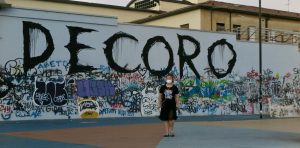Santo Beijing is home to thousands of fast-fashion factories, where every day, thousands of undocumented migrants work 12 hours a day, seven days a week, in confined conditions for their overlords with the sole purpose of producing clothes that will eventually be thrown away. It is a money laundering, tax evasion haven within a 100 billion euro industry situated in the heart of Tuscany, Italy.
This is the dark side of Prato’s Chinatown.
***
Pre-pandemic, China had its sights on Italy as a potential partner in its controversial Belt and Road Initiative (BRI). The Chinese and Italian leaders, Xi Jinping and Giuseppe Conte, signed an Memorandum of Understanding (MoU) in March 2019 on furthering China’s ambitious BRI into Europe via Italy. Greece and Italy were the only two European countries to sign the agreement, much to the concern of other European and Atlantic partners.
Flash forward a year, and Italy was dealing with a catastrophic wave of COVID-19, which saw the largest death toll in the country since World War II. Some observers questioned whether the Chinese-operated textile factories in the Tuscany region triggered the devastating outbreak.
The China-Italy entrepreneurial partnership came under increasing suspicion, and a change in government that brought Mario Draghi to the prime ministership saw steps to derail the MoU and revert to Italy’s traditional transatlantic partnerships.
The newly elected Prime Minister Giorgia Meloni’s cabinet appears to be following this trend of formal push-backs against China; however, it is more than likely that Italy will still renew the MoU this year. It is unclear how many agreements there are under the MoU framework or their exact content.
China-Italy Historical Ties
Since former Prime Minister Romano Prodi organized a trade mission to China in 1997, all administrations, except Silvo Berlusconi’s, have shown a particular interest in maintaining good trade relations with China.
When Chinese shipping company COSCO took control of Greece’s Piraeus terminals in 2016 and Greece joined the BRI in 2018, it established a set of almost obligatory choices, an aspirational pathway toward growth, for countries in desperate economic woe.
According to a 2016 University of Bologna study on the impact of the “New Silk Road” inside the EU market, 13 percent of Chinese trade passed through Greece. The study suggested that the shift in trade through Greece could increase even more if Piraeus was rail-linked to Central Europe. One of the goals of the Italian government was to mitigate such a possibility through soft power that leveraged Italian ports already connected to Central Europe. It was in that spirit that Italy joined the BRI in 2019.
At the same time, leaders in the EU and the United States worried about having a G-7 country join the BRI. Undoubtedly, China is today’s number one U.S. rival, and a massive geopolitical project such as joining the BRI could put Italy’s national security at risk. In addition, there has been a lack of transparency and proper consultation on the BRI by both Chinese and Italian counterparts, which may lead to a whole host of exploitative problems.
The EU and the U.S. have expressed concerns that the BRI in Italy could lead to a “debt trap,” such as that witnessed in developing countries like Sri Lanka. Struggling to pay debts, some BRI participant countries have been forced by circumstances to concede power over ports and other infrastructure to Chinese interests.
Moreover, China analysts think that the BRI could lead to increased competition for EU companies and potential lost jobs and market share. Other issues raised are the lack of compliance with these projects in meeting strict EU standards and regulations, most importantly, adhering to workers’ rights.
The potential implications of the BRI will also impact the EU member states’ democracy and their independence from any form of foreign influence.
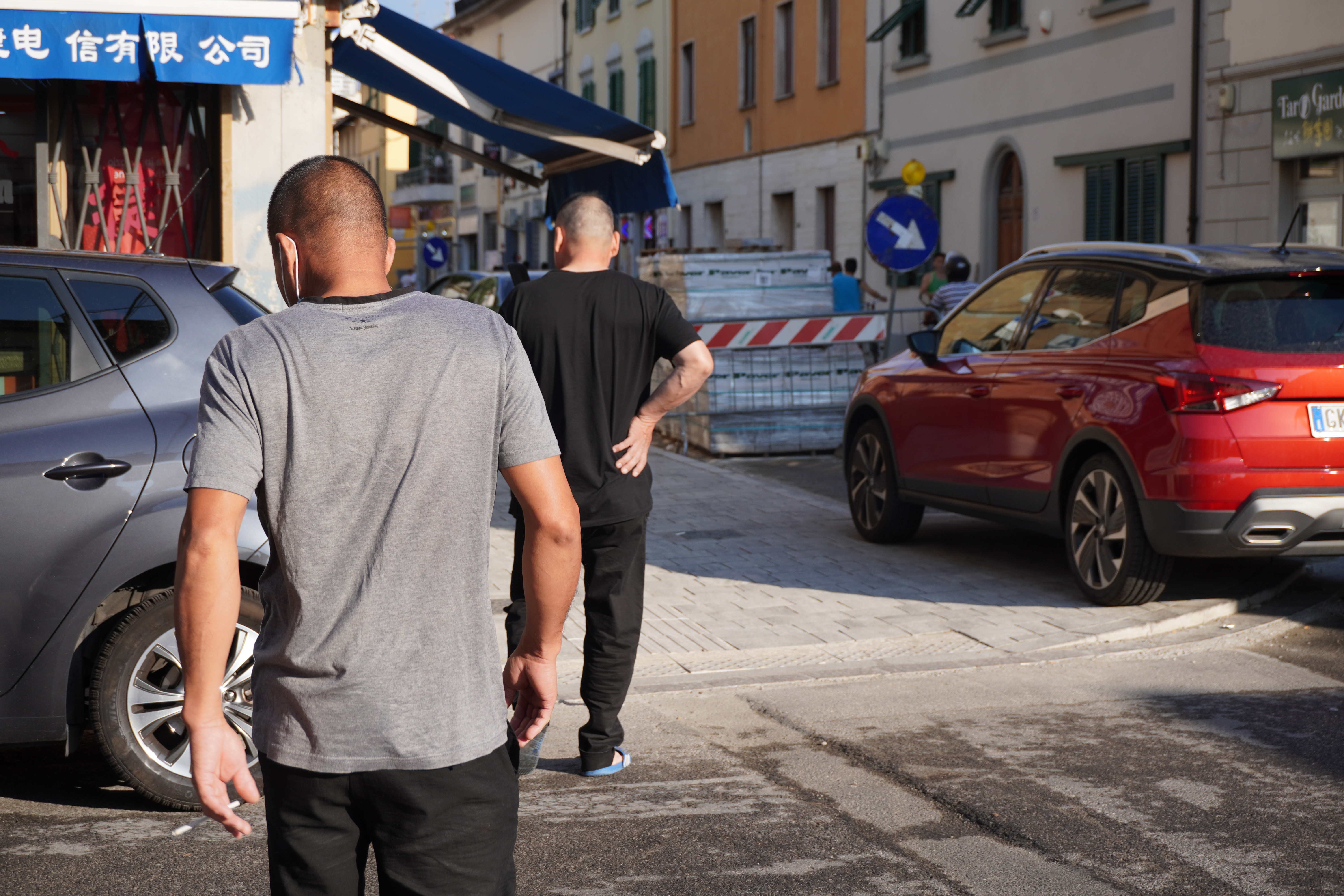
Chinese residents walking the streets of Prato’s Chinatown. Photo: Hugh Bohane.
China and Italy’s Textiles Cooperation Today
Known as the Manchester of Italy, Prato has been one of the country’s primary manufacturing hubs since the 1960s economic boom in Italy and has played a key role in exporting the Italian fashion industry worldwide. Located just 20 kilometers from Florence, Prato’s prominent textile industry has long been a preferred destination for Italian domestic workers.
In 2019, pre-pandemic, the Italian Textile and Fashion Federation — Sistema Moda Italia (SMI) — estimated that Italy’s textile and fashion industry was worth approximately 56 billion euros in total. Today, the Italian industrial association Confindustria Moda expects the industry to be worth roughly 107 billion euros.
In the last century, Prato’s population grew from 50,000 in 1901 to 180,000 in 2001. At the same time, migration attracted at least 30,000 overseas Chinese residents (mainly from Zhejiang and Fujian provinces); however, some authorities suggest it is double or three times higher when considering the number of undocumented immigrants. Italian police told The Diplomat that they estimate that there are around 50, 000 undocumented workers in Prato.
In 2009 Dongke Mo from the Italian Chinese Association in Prato was quoted as saying, “In America, you absorb immigrants. In Italy, the Chinese are looked on as labor.”
Integration of the Chinese community into Italy is still fraught, with a multitude of problems today. In Prato, The Diplomat spoke with Captain Lorenzo Marzioli at the Finance Police’s headquarters. “The Chinese community in Prato simply wants to make money and establish itself in the global market. There are now Chinese accountants and notaries working for Chinese companies inside Italy,” said Marzioli.
The “Made in Italy” label is something Chinese entrepreneurs and their consumers highly value.
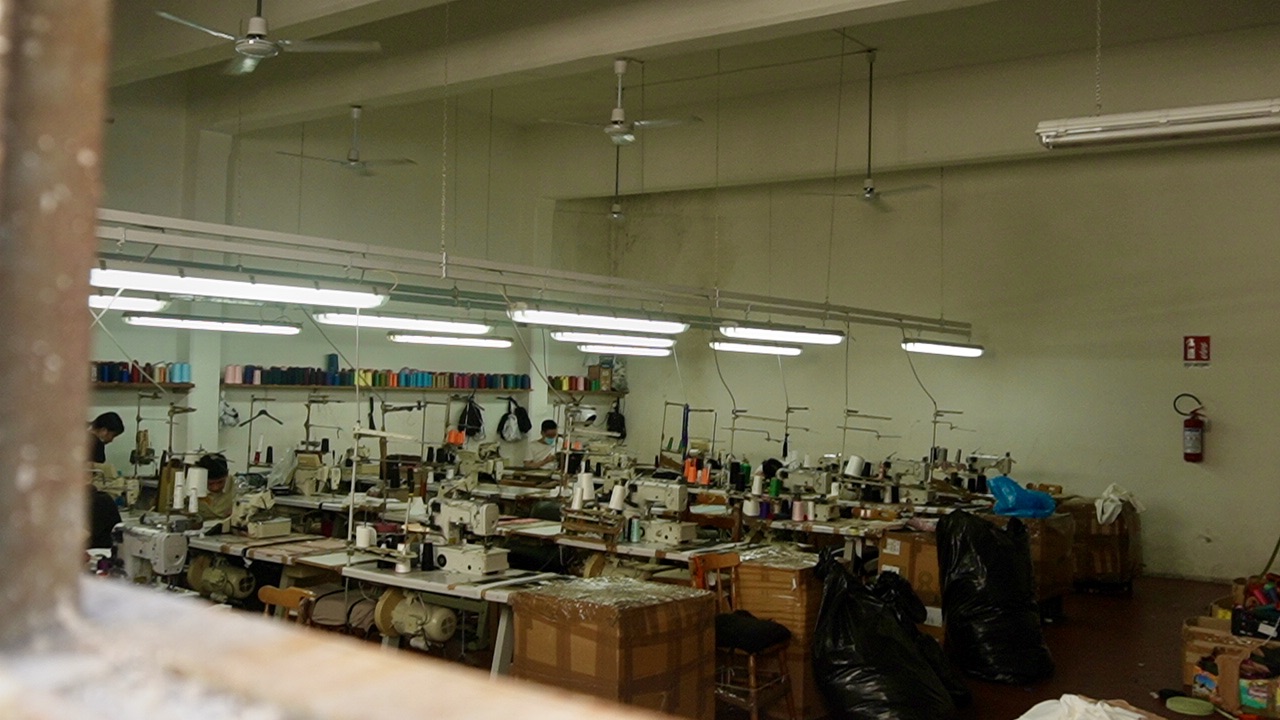
The inside of a Chinese workshop in Prato. Photo: Hugh Bohane.
Counterfeiting, Managed by Supranational Organized Crime
After Milan, Prato has the second highest level of money laundering in Italy. The role of organized crime has led to a qualitative leap in the production of counterfeit goods by transnational criminal organizations, which have been working on a global scale to counterfeit market goods and maximize economic returns.
Collusion between Italian and Chinese organized crime such as counterfeiting luxury brands like Gucci, Fendi, Prada, and Dolce & Gabbana, was highlighted in the 2018 arrest of Chinese national Zhang Naizhong in Italy.
“The role of the Guardia di Finanza (Italian finance police) is to study these [criminal] phenomena and to curb them,” Marzioli said.
The member states of the EU that decided to open up to the markets of China allowed the entry of a wide range of products, including not genuine ones, which in turn can lead to money laundering. It’s something the authorities find difficult to track.
According to Marzioli, “It is a highly structured organized crime system of money laundering aimed to evade EU taxes.”
“The difficulty lies in the nature of the national customs system, which, although systematized, does not yet function as a perfectly working machine,” he said.
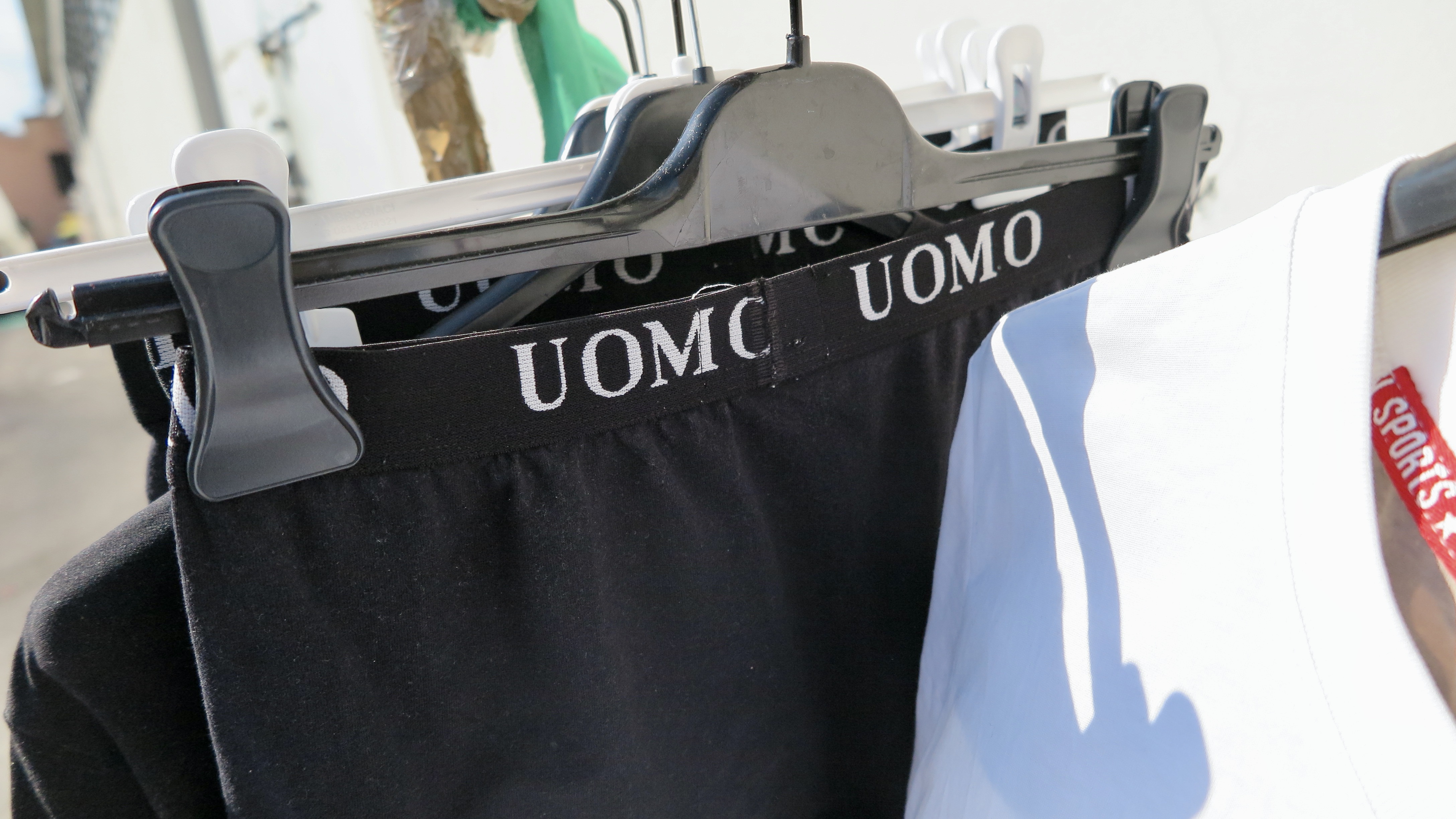
Underwear produced in Prato hangs on a rack. Photo: Leonardo Delfanti.
When goods enter the EU, only import customs duties must be paid. At that time, the product’s circulation is under suspension of Value Added Taxes (VAT); however, it must be paid later in the country of destination. By simulating the purchase directly from a manufacturer in China, nothing is actually converted into real funds. This is one way that organized crime groups conduct money laundering.
The raw materials should arrive in Prato’s department stores. Nevertheless, “often and willingly, we have reverse billings that bring back funds to China and appear as though they come as legitimate transfers,” Marzioli explained. Inevitably, this happens in other parts of Europe, “for example, in Paris too,” he added.
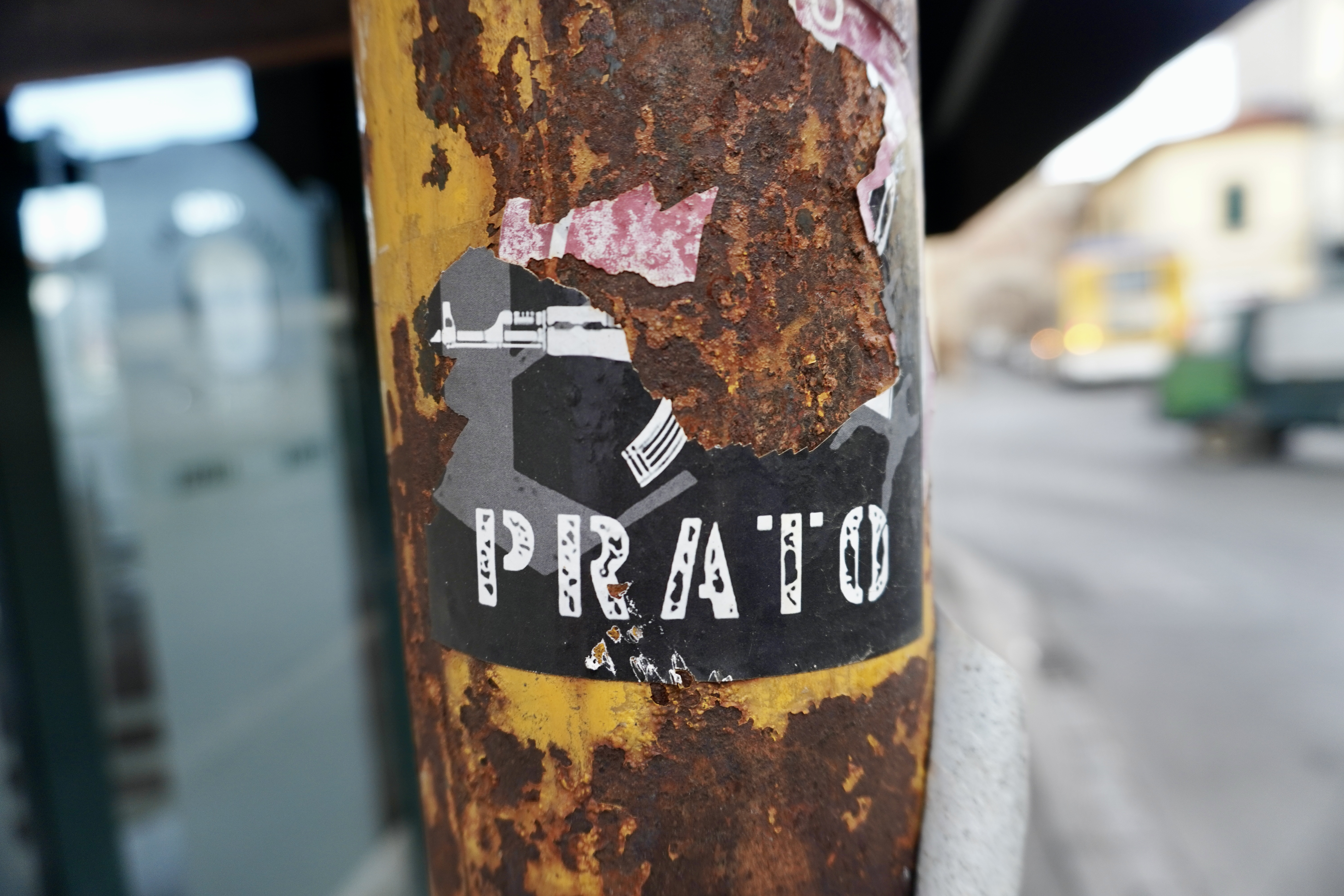
A sticker labeled ‘Prato’ on a street pole in Chinatown. Photo: Hugh Bohane.
The Diplomat’s On-the-Ground Investigation in Prato
Two international journalists, one from Italy and the other from Australia, recently investigated the current situation on the ground in Prato’s Chinatown, better known as Santo Beijing.
While walking in the city center, they approached a Pakistani man, Ali*, in his early 30s, who wished to remain anonymous. He said he works in a Chinese textile factory in Prato, seven days a week, 12 hours per day. He gets paid 1,200 euros a month, while he has to pay 200 euros monthly rent. There are no sick days. If he misses a day, 50 euros are deducted from his salary.
He said that Chinese employees are working alongside him. They are paid 1,700 euros monthly and receive free accommodation, food, and cigarettes.
Before nightfall, Ali knocks at the factory door and then starts working in silence. The bosses don’t talk to him. He is forbidden from even going to the toilet during work hours.
He referred to himself as a modern slave. “I have no dignity at all.”
But he accepts it, saying that this is what Allah has chosen for him, so it must be this way.
We asked him multiple times whether he wanted to share his story under his real name on record, but he said it was not safe. He said no amount of media coverage could make a difference, and he thinks the mindset of his Chinese “laoban” (the Mandarin term for “boss”) won’t change.
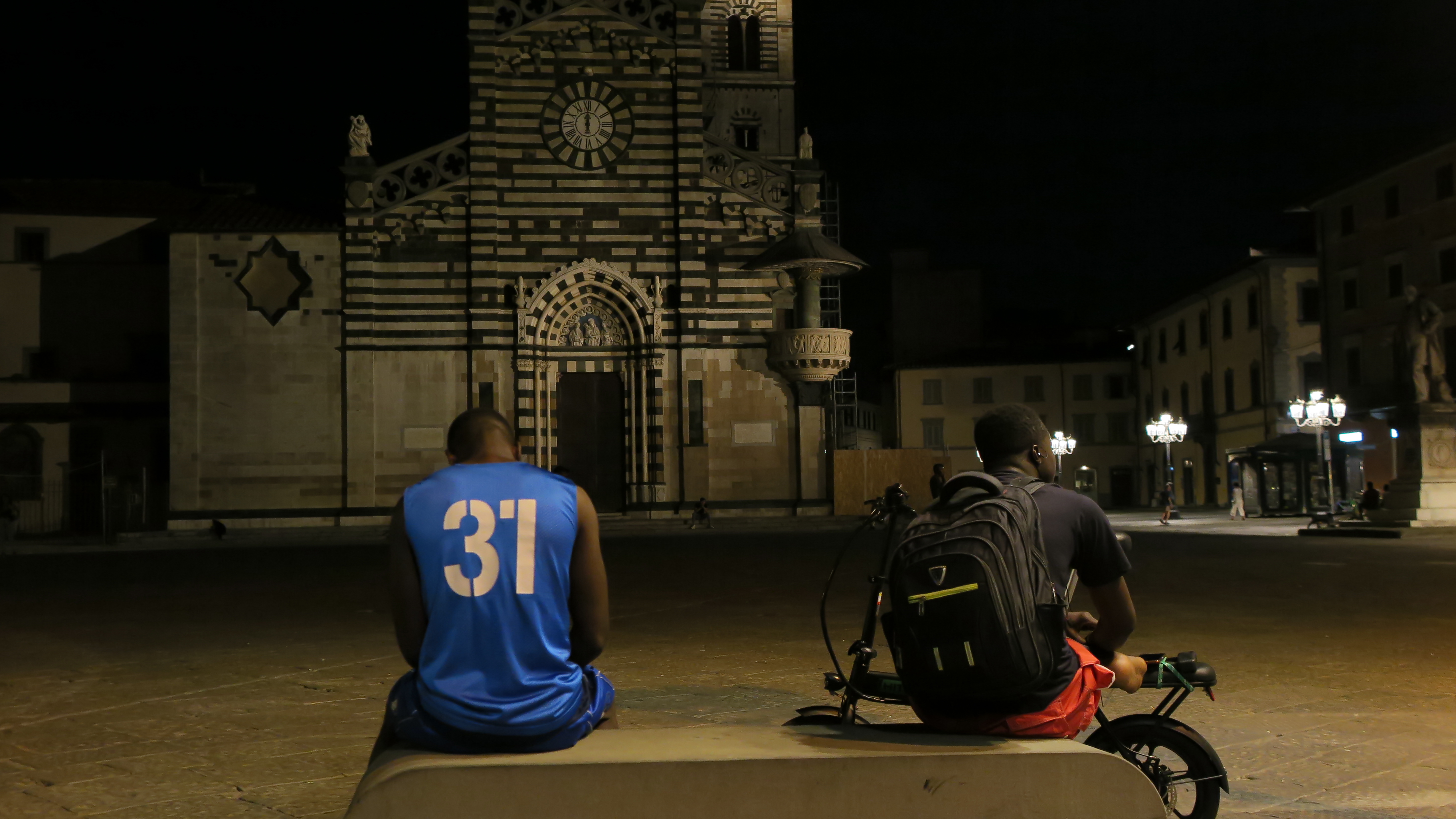
Migrants sitting in front of Prato’s dome. Photo: Leonardo Delfanti.
Ali is undocumented. Chinese employers generally tend to hire only undocumented workers as a way to keep them in “debt bondage.” As part of their “deal,” Ali thinks that his boss will provide him with the necessary documents later this year.
We contacted SI Cobas an Italian working union, multiple times for comment on this issue, but received no response.
In recent years, police have raided hundreds of crowded workshops where Chinese live, work, and sleep. The majority of the workers earn far below the standard wage and live in confined spaces, yet they produce goods that are reportedly sold in high-end designer shops.
There have been multiple fires inside Chinese workshops in Prato, with two blazes occurring last year alone. One was caused by arsonists back in September 2022; eight workshops housing 15 companies were destroyed.
While in Santo Beijing, we met a few people of Chinese heritage drinking beer on a bench on Pistoiese street. They told us they had been living in Italy for 20 years, which was echoed by many Chinese people we spoke to. “I never saw Brunelleschi’s Dome,” one of the men said, referring to the fact that he had never been to the center of Florence, only 20 kilometers from Prato.
“Italy is no good, there is no work, there is no money here… Germany is better,” said one middle-aged Chinese man from Xiamen.
Chinese residents have their hotpot restaurants, supermarkets, schooling, dentistries, medical centers, legal firms, and CCTV cameras, all within the bubble of Prato. So few residents would ever feel the need to leave Chinatown.
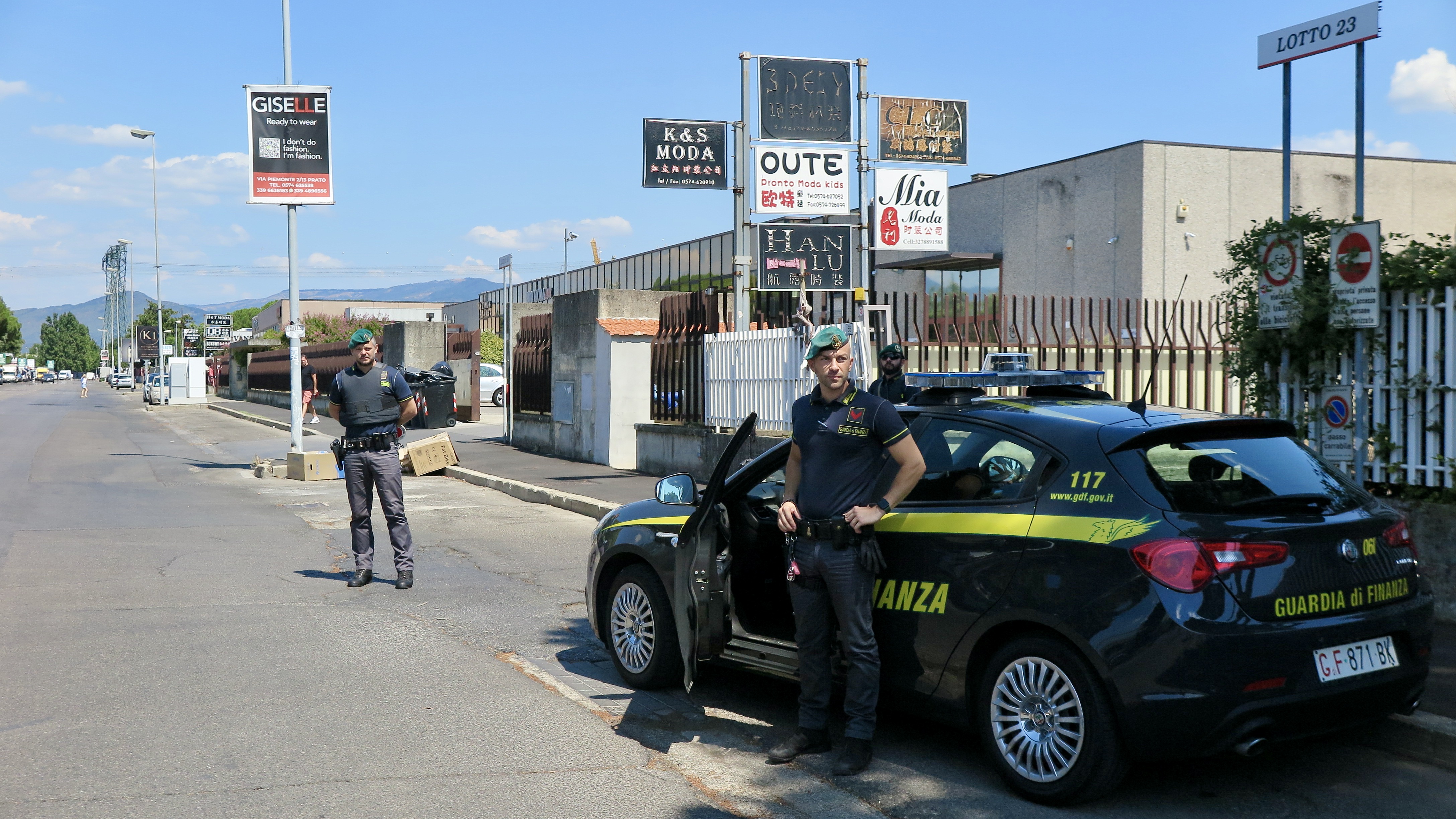
Embedded with the Italian financial police in Macrolotto. Photo: Leonardo Delfanti.
Embedded with the Italian Finance Police
The Diplomat also spent a day embedded with the Italian Finance Police in Prato.
We visited Macrolotto 1, escorted by two patrol cars. The police, armed with machine guns, showed us the enormity of the area occupied by Chinese-run fast-fashion firms. According to a 2017 Chamber of Commerce report, the Chinese own 5,676 textile companies in Prato.
The Italian police appeared somewhat apprehensive and wanted us to keep a safe distance from the Chinese-run workshops while we took photos.
Security is also a high priority amongst the Chinese inside Prato. “There have been recent Italian retaliatory measures against the Chinese community,” an unnamed police officer told us.
Macrolotto 1 is an industrial area occupied by Chinese fast-fashion firms. Since the beginning of Chinese migration, there has been an ongoing relationship between Italian and Chinese entrepreneurs. “For example, some leading [Italian] brands ask Chinese entrepreneurs to work for them,” said the police. Although the pandemic has caused a slowdown in production, Prato-made fast-fashion goods are sold across Europe.
One of the main changes in the post-pandemic fast-fashion era is with the production line. Finding a warehouse full of illegal goods is difficult. To increase profits and avoid controls, once a truck full of raw materials arrives in Prato, it only takes a couple of working nights to assemble the final product and send it out.
“If rules were to be respected, the payment of allowances, the maturation of compulsory rest periods… Things incompatible with the production methods of fast fashion would be addressed,” Captain Marzioli emphasized.
Through economic controls, the finance police get an index of where to start; through their investigations, they probe and monitor production activities. The officers used an Italian metaphor, “Our territory is an ocean to be fished,” meaning the territory is an ocean where they find the little fish first, which then leads them to the big fish.
“When we operate in Prato, even in the ordinary controls of the territory, that is, with the patrol, even at a simple census, there are plenty of people hiding in the shadows,” Marzioli said. This proof, together with the high presence of forged residency papers, makes it clear to him “that there are symptoms of potential human trafficking being conducted here.”
Chinese entrepreneurs are just one group taking advantage of the system. In 2020, after three years, the finance police completed an investigation under the code name “Golden Wood,” which uncovered the laundering of approximately 39 million euros involving about 33 enterprises connected to the Cosa Nostra (an Italian organized crime group).
Between 2016 and 2019, Italy and China used to hold joint police patrols for tourism purposes and more minor issues, but the patrols were suspended during the pandemic.
In the latter part of 2022, human rights NGO Safeguard Defenders reported the presence of illegal Chinese police stations in Prato, Milan, Rome, and Florence headed by the authorities in Fuzhou province, China.
In their “Patrol and Persuade” report, Italy stands out as a “pilot” project where Chinese authorities use threats, intimidation, harassment, and even kidnappings against targets abroad to “persuade them to return” home. As open source evidence from PRC authorities or its state/party media repeatedly iterates, bilateral police cooperation agreements seek to co-opt political, media, and business figures to align policies and narratives with the CCP’s preferences.
We asked the finance police back in August 2022 whether they had any prior knowledge about secret Chinese police stations in Prato. They said they didn’t and could not share further details.
The Diplomat contacted Laura Harth, campaign director at Safeguard Defenders, to get her line on the overall situation. For her, the Italian police not knowing about secret Chinese police stations appears “highly unlikely.”
“Open source evidence shows how Italian police officials partook in the ‘unveiling’ of a similar center in Rome in 2018. Additionally, some comments made by authorities following the release of our investigations are contradictory when they state they were ‘monitoring’ the situation.
This implies they were aware of their existence. Counter to the vast majority of democratic allies, Italy has still not clearly stated that it considers these centers illegal and a violation of territorial sovereignty,” she said.
In terms of the BRI, Harth thinks that Italy renewing its agreement with China is a risk: “We urgently need a comprehensive review of existing agreements across departments, evaluate their appropriateness today and repercussions, and come up with an informed and coordinated approach to bolster Italy’s future resilience and safeguard national security.”
“I continue to hope Italy’s government will move beyond the easy symbolic act to appease allied nations and take the necessary – and sometimes difficult – steps to recognize and address the multiple threats to its national security and interests.”
Among the Italian business community, influence and coercion are exercised on policymakers. “Italy is far less dependent on the Chinese market than it sometimes seems to think itself,” she said, but it is not an Italy-specific issue. All democratic nations need to confront this together to build clean and resilient markets.
China and other authoritarian actors do not abide by the international rules-based order and are engaged in hybrid warfare aimed at weakening democracies and dividing democratic alliances. In this hybrid warfare, they use all tools at their disposal, including the influence and interference operations such as with the “overseas police service centers,” co-option and coercion of business communities, media manipulation and disinformation campaigns, and so forth.
“Unless we resolutely recognize and address these issues in a whole-of-society approach and coordination with allied nations, the risks (and difficulties to address them down the line) will continue to increase.”
***
*names have been changed to protect people’s identities.
This investigation was sponsored by Free Press Unlimited and Transitions through a European Union fund.













